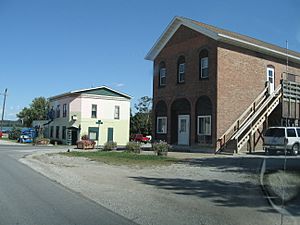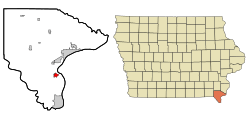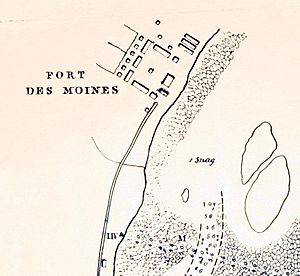Montrose, Iowa facts for kids
Quick facts for kids
Montrose, Iowa
|
|
|---|---|
 |
|

Location of Montrose, Iowa
|
|
| Country | |
| State | |
| County | Lee |
| Area | |
| • Total | 1.23 sq mi (3.18 km2) |
| • Land | 1.21 sq mi (3.13 km2) |
| • Water | 0.02 sq mi (0.04 km2) |
| Elevation | 531 ft (162 m) |
| Population
(2020)
|
|
| • Total | 738 |
| • Density | 610.42/sq mi (235.60/km2) |
| Time zone | UTC-6 (Central (CST)) |
| • Summer (DST) | UTC-5 (CDT) |
| ZIP code |
52639
|
| Area code(s) | 319 |
| FIPS code | 19-53760 |
| GNIS feature ID | 0459199 |
Montrose is a small city in Lee County, Iowa. In 2020, about 738 people lived there. It is located right on the famous Mississippi River. Montrose is part of a larger area called the Fort Madison-Keokuk Micropolitan Statistical Area.
Contents
History of Montrose
The area where Montrose is located has been lived in for a very long time. People have been here since at least the 1780s. This was when Quashquame's village was set up nearby. The spot was important because it was at the start of the Des Moines Rapids. These rapids made it hard for large boats to travel. Boats had to unload their goods here and move them over land to get past the rough water.
Montrose was once the site of Fort Des Moines No. 1. This was a military base that operated from 1834 to 1837. In 1836, the fort's commander, Lieutenant-Colonel Mason, started planning the town. Later that year, David W. Kilbourne finished the town's layout and named it Montrose.
From 1839 to 1846, many members of the Church of Jesus Christ of Latter Day Saints lived in Montrose. In 1839, many people stayed in an old army barracks in Montrose. This was a good temporary home while they built houses in nearby Nauvoo, Illinois. Famous residents during this time included Brigham Young, Wilford Woodruff, and Erastus Snow. Some stories say Montrose's streets were lined up to see the Nauvoo Temple across the Mississippi River. However, the streets actually follow the original layout of Fort Des Moines from 1834.
Montrose officially became a city in 1857. Doctor J. Anderson was elected as the first mayor in June of that year. Montrose became an important river town. This changed when a canal was built near Keokuk. The canal made it easier for boats to bypass the rapids, which meant less business for Montrose.
Geography and Location
Montrose is located at specific coordinates: 40.53 degrees north and -91.417 degrees west.
The city covers a total area of about 1.14 square miles (2.95 square kilometers). Most of this area, about 1.12 square miles (2.90 square kilometers), is land. A small part, about 0.02 square miles (0.05 square kilometers), is water.
Montrose is part of Montrose Township. It is also located along the Chicago, Burlington and Quincy Railroad line.
Population Information
| Historical populations | ||
|---|---|---|
| Year | Pop. | ±% |
| 1850 | 454 | — |
| 1870 | 905 | +99.3% |
| 1880 | 983 | +8.6% |
| 1890 | 778 | −20.9% |
| 1900 | 748 | −3.9% |
| 1910 | 708 | −5.3% |
| 1920 | 549 | −22.5% |
| 1930 | 621 | +13.1% |
| 1940 | 592 | −4.7% |
| 1950 | 643 | +8.6% |
| 1960 | 632 | −1.7% |
| 1970 | 735 | +16.3% |
| 1980 | 1,038 | +41.2% |
| 1990 | 957 | −7.8% |
| 2000 | 957 | +0.0% |
| 2010 | 898 | −6.2% |
| 2020 | 738 | −17.8% |
| Source: and Iowa Data Center Source: |
||
Montrose Population in 2020
According to the census in 2020, Montrose had 738 people. There were 314 households and 205 families living in the city. The population density was about 610 people per square mile.
Most of the people in Montrose were White (95.7%). A small number were Black or African American (0.1%), Native American (0.3%), or Asian (0.1%). About 3.4% of residents were of two or more races. About 1.2% of the population was Hispanic or Latino.
The average age in Montrose was 48.4 years. About 20.6% of residents were under 20 years old. About 25.2% were 65 years old or older. The population was 48.0% male and 52.0% female.
Montrose Population in 2010
The census in 2010 showed that Montrose had 898 people. There were 359 households and 242 families. The population density was about 801 people per square mile.
Most residents were White (98.2%). A small number were African American (0.4%) or Asian (0.3%). About 1.0% were of two or more races. About 0.6% of the population was Hispanic or Latino.
The average age in Montrose was 47.4 years. About 18.5% of residents were under 18 years old. About 20.6% were 65 years old or older. The population was 48.9% male and 51.1% female.
Education in Montrose
Students in Montrose attend schools that are part of the Central Lee Community School District.
Famous People from Montrose
- Cal McVey – A baseball player from the 1800s.
- Margaret Warner Morley (1858–1923) – An educator, scholar, and writer.
- Cato Mead – The only known African American American Revolutionary War veteran buried west of the Mississippi River.
- Nedra Volz (1908-2003) – A character actress.
- Jerry R. Junkins – Former president, chairman, and CEO of Texas Instruments, Incorporated.
- Lowell Junkins – An Iowa State Senator from 1973 to 1985. He has also been Chairman of the Board at Federal Agricultural Mortgage Corporation since 1996.
Important Buildings
See also
 In Spanish: Montrose (Iowa) para niños
In Spanish: Montrose (Iowa) para niños


